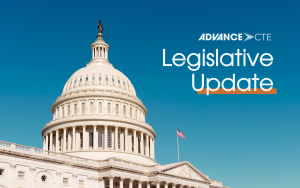
Over the last two weeks, the Senate has continued to make progress on 2026 federal fiscal year (FY26) funding, including for the Carl D. Perkins Career and Technical Education Act (Perkins V), as the Trump administration announces that it will reverse course and release previously withheld education formula funding due to states for the current fiscal year. Elsewhere, the administration has made new announcements regarding Artificial Intelligence (AI) and plans for new postsecondary rulemaking.
Senate’s FY26 Funding Bill Rejects Trump Administration Proposals
Yesterday, July 31, the Senate Appropriations Committee approved its FY26 Labor-HHS-ED bill– legislation that provides annual funding for Perkins V’s state grant program along with other critical education and workforce development investments. The legislation is a critical step in the wider federal FY26 budget and appropriations process, which must be completed by October 1 of this year.
The measure would, if enacted, provide level-funding for Perkins V’s state grant program aligned with current levels of investment of roughly $1.45 billion annually. In addition, the bill would provide $12.4 million for Perkins V’s national activities account to support ongoing research and evaluation efforts, as well as up to $6.1 million for the law’s Innovation and Modernization grant program. Overall, the bill rejects the vast majority of the Trump administration’s FY26 budget request, which proposed significant funding cuts to many programs administered and overseen by the U.S. Departments of Education (ED) and Labor (DOL). Instead, the legislation would extend current levels of funding for most other education and workforce development programs with a handful of minor exceptions.
Most notably, the legislation includes several new provisions intended to strengthen and clarify existing appropriations requirements on a number of fronts. The bill would require the state formula grant funding, including state grant resources authorized by Perkins V, be made available to states on a more timely basis. This appears to be a significant rebuke of the Trump administration’s ongoing attempts to withhold or otherwise delay the disbursement of federal formula funding (more on that below).
In addition, the bill would prohibit the U.S. Department of Education (ED) from transferring oversight authority of the Every Student Succeeds Act (ESSA) and the Individuals with Disabilities Education Act (IDEA). This element of the legislation appears to be in response to ED’s recent efforts to transfer oversight of programs, like Perkins V, to other agencies and likely future attempts to do the same for other programs currently administered by ED. Finally, the Senate bill would require the administration to adequately staff Departments and agencies at levels necessary to fulfill its statutory obligations– an apparent response to recent efforts by the Trump administration to lay off significant portions of the federal workforce.
The FY26 Labor-HHS-ED funding measure was marked up and considered by the full Senate Appropriations Committee, which approved the legislation on an overwhelming bipartisan basis with a vote of 26-3.
Advance CTE applauds the Senate’s bipartisan work to advance this legislation and the inclusion of new provisions to strengthen and clarify the requirements of federal appropriations laws. Lawmakers in the House are widely expected to take a different approach to FY26 funding, which is tentatively scheduled to be considered in the chamber in early September, once lawmakers return from Congress’s annual August recess period.
Contact Congress to Oppose ED’s Efforts to Eliminate CTE
Advance CTE and partners have continued to raise significant legal and operational concerns regarding ED’s recently announced “workforce partnership” with DOL. As designed, ED will now reimburse DOL on an ongoing basis to implement Perkins V and adult basic education programs. It remains wholly unclear how this arrangement, advanced as part of an Interagency Agreement (IAA), will improve the implementation of Perkins V, particularly as states will now be required to navigate two separate layers of federal bureaucracy. Many of these concerns were recently outlined in this post.
In recent weeks, leadership at ED has argued that subsuming Perkins V and Career Technical Education (CTE) administration into the wider public workforce system, as laid out in the IAA, is necessary for the creation and adoption of Learning and Employment Records and wider skills-based hiring efforts. According to the blog post, these efforts would be supported using Perkins V Innovation and Modernization (I&M) grant funding. Yet, it remains unclear why the IAA would be necessary to facilitate such initiatives when they are already underway in a number of states throughout the country and the I&M funding stream is already available to support these efforts.
Advance CTE remains strongly opposed to this effort to segregate CTE from the American education system and encourages the wider CTE community to contact their Members of Congress to urge them to do the same. To do so, click this link!
Trump Administration Releases Withheld Education Funding
Late last week, the Office of Management and Budget (OMB) announced that it would release the remaining several billion dollars in education formula funding that had been withheld several weeks ago. This includes funding for ESSA Title I-C (Migrant Education), ESSA Title II-A (Supporting Effective Instruction), ESSA Title III-A (English Language Acquisition), ESSA Title IV-B (summer and afterschool programming), and Adult Education and Family Literacy State grants authorized by the Workforce Innovation and Opportunity Act (WIOA) Title II. Funds withheld from Title IV-B for summer and after-school programs were previously released the week of July 24th.
Critically for states and subgrantees, the release of these funds comes with new requirements to ensure that these investments are not used in ways that are at odds with the Trump administration’s wider priorities. In addition, OMB’s leadership has continued to indicate broader plans to formally rescind additional education funding before the end of the current federal fiscal year– an effort that has yet to fully materialize but may implicate some of these resources in the future.
U.S. Department of Justice Issues Guidance on DEI Programming in Education
This past Wednesday, the Department of Justice (DOJ) issued guidance on Diversity, Equity, and Inclusion (DEI) programs and single-sex spaces that clarifies when schools and institutions may be at risk of losing access to federal funding. The Department’s guidance, coming in response to an earlier Executive Order on this topic, singled out policies and programs that promote race-based scholarships, internships, mentorship programs, or leadership initiatives for specific racial groups.
The new guidance warned federally-funded grantees against the use of language such as “underrepresented groups”, “lived experience,” “overcoming obstacles”, or “cross-cultural skills” in hiring or admissions, or seeking candidates from specific geographic areas and similarly identified “safe spaces” and designated areas for racial and ethnic affinity groups as unaligned with the administration’s current posture on this topic. Read the full DOJ memo.
U.S. Department of Education Issues Letter on ESSA Waivers
Early this week, the U.S. Department of Education (ED) sent a letter to all chief state school officers encouraging them to make use of existing statutory flexibilities and seek waivers from statutory and regulatory provisions outlined in ESSA. The letter emphasized states’ ability to advance innovation in areas such as statewide assessments, curriculum design, and strategies for supporting and improving schools identified for comprehensive support under state accountability systems using these existing waiver authorities. The letter also noted flexibility in school funding. Read the full letter.
Trump Administration Continues to Prioritize AI and Education
This week, the White House launched its Presidential AI Challenge. The national challenge will be incorporated into “America250” celebrations, where K-12 youth, educators, mentors, and community teams will work to solve real-world problems in their communities using AI-powered solutions. An opportunity to showcase AI solutions at a national level will conclude with a three-day, in-person event, including a White House showcase of selected Regional Champions. To learn more about the challenge, including who is eligible to participate and how to register, visit the initiatve webpage.
Relatedly, the Department of Education (ED) has also recently announced that the third challenge in the CTE Momentum series, the “Your AI Horizons Challenge,” will launch in early August. The challenge will invite high school CTE students to explore how AI can engage careers across all industries. Advance CTE encourages the community to share this information with your colleagues and wider networks.
In addition, ED recently published a proposed supplemental grant priority in the Federal Register that focuses on AI in education. ED has indicated that this new priority will be used to determine K-12 and postsecondary discretionary grant awards. Learn more here. ED has also issued new guidance on AI use in education that outlines how AI may be used across key educational functions, articulates principles for the responsible use of AI, and affirms that such uses are allowable under existing federal education programs, provided they align with applicable statutory and regulatory requirements. Read more about these efforts.
Finally, the administration has recently published a long-anticipated report connected to President Trump’s recent Executive Order on AI in education. The report offers a host of recommendations to promote and advance AI literacy and wider education efforts, including by leveraging CTE. Read the AI Action Plan.
Odds & Ends
- Advance CTE endorsed the introduction of the Creating Opportunities to Thrive and Advance (COTA) Act– legislation that would expand career counseling opportunities for learners and increase awareness of services available under WIOA. Read the press release.
- ED has announced it will be convening two negotiated rulemaking tables later this year to develop new rules implementing major aspects of Congressional Republicans’ reconciliation legislation. Regulations regarding the newly created Workforce Pell Grant program will be included in the second “AHEAD” table scheduled to begin this December. Read the announcement.

